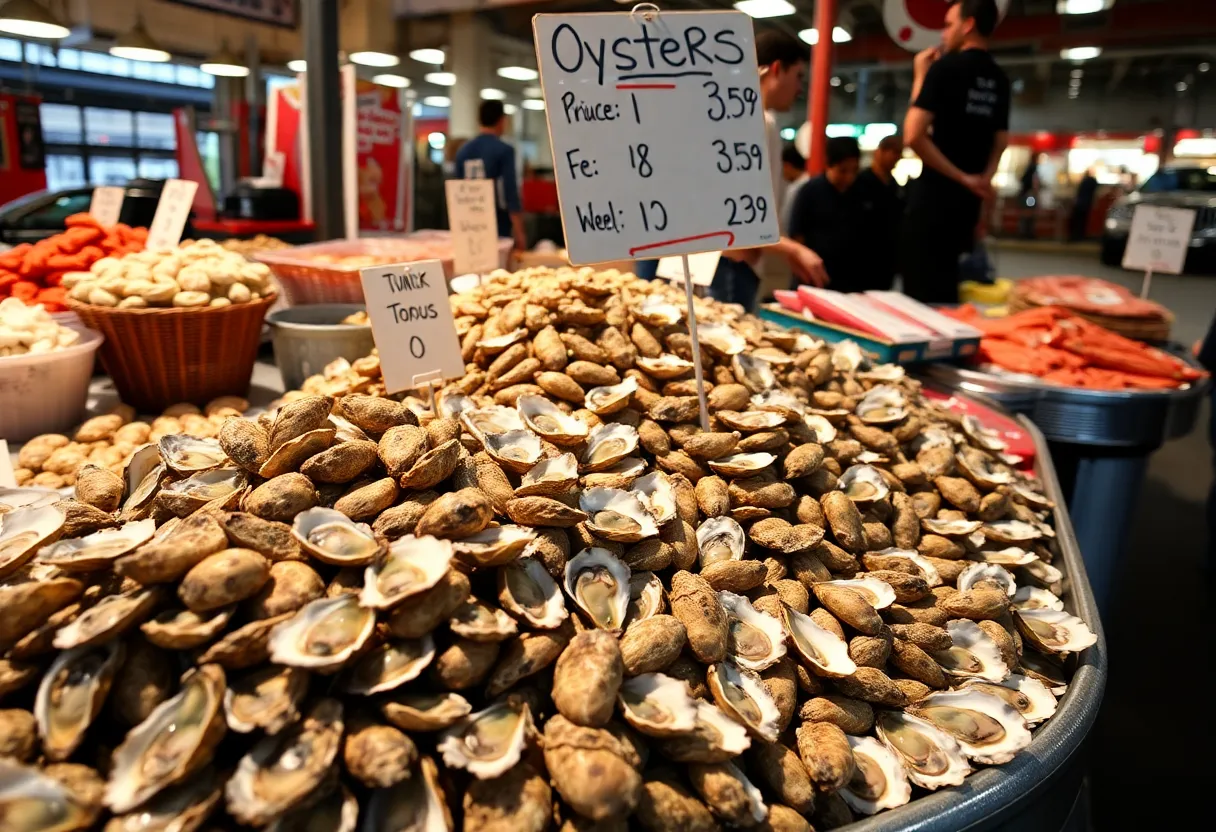Fishtown Seafood
Fishtown Seafood is a Philadelphia-based seafood business owned by Bryan Szeliga, with retail and wholesale locations in Philadelphia and Haddonfield, NJ. Established with a focus on fresh seafood, the company specializes in sourcing high-quality oysters, which constitute 60% to 70% of its revenue. Over the years, Fishtown Seafood has built a strong reputation for providing diverse seafood options to its customers. The business faces ongoing challenges due to fluctuating tariffs on Canadian imports, particularly oysters, which impact pricing and supply chain planning. Despite these hurdles, Fishtown Seafood remains committed to adapting its offerings and maintaining customer satisfaction.
News Summary
Fishtown Seafood, a prominent seafood provider in Philadelphia, confronts significant challenges as unpredictable tariffs on Canadian oysters create instability in their operations. With oysters generating 60-70% of their revenue, owner Bryan Szeliga is forced to adapt by potentially limiting product variety and absorbing rising costs. The broader seafood industry relies heavily on Canadian imports, raising concerns about the future of pricing and availability for consumers.
Philadelphia Seafood Business Faces Uncertainty Amid Fluctuating 25% Tariffs on Canadian Oysters
Philadelphia, PA – Fishtown Seafood, a seafood business owned by Bryan Szeliga, is grappling with uncertainty and instability due to recent tariff fluctuations affecting Canadian oysters. Oysters account for a significant portion of Szeliga’s sales, making up between 60% to 70% of his revenue across three retail and wholesale locations in Philadelphia and Haddonfield, NJ. The Trump administration’s on-again, off-again decision to implement and suspend a 25% tariff on Canadian imports has raised concerns for Szeliga’s future business planning.
With the tariff’s unpredictability complicating his operational strategies, Szeliga expressed that these chaotic changes hinder accurate business forecasting. Suppliers have already notified him of impending price increases as a direct result of the tariffs. To mitigate costs for his customers, Szeliga opted to absorb the increased expenses from one recent oyster purchase, which he did at a 25% markup.
As he anticipates further adjustments to his supply chain, Szeliga is strategically working with wholesale clients to develop menus that minimize the financial impacts of possible future tariffs. Furthermore, he may choose to swap out higher-priced oyster varieties for more cost-effective domestic options or lower-priced oysters from Canada. This pivot is essential for maintaining his business while also catering to customer preferences.
The broader context of the seafood industry reveals that the total value of imported seafood in the U.S. was $25.5 billion in 2023, with Canada being a significant supplier providing over $3.6 billion worth of seafood. In recent trends, seafood imports from Canada have increased by 10% in 2024, reaching an estimated $3.96 billion according to USDA data. Although oysters represent a small sector within total seafood consumption, their demand has surged, with oysters featured on the National Fisheries Institute Top 10 List in 2022, reflecting a growing consumer interest.
Szeliga has expressed concerns that ongoing tariff complications could stifle growth in the oyster market, potentially leading to fewer options and higher prices for consumers. To navigate these challenges, he plans to limit the variety of oysters offered in his shop from 12 to 10, balancing high and low-priced options to cater to diverse customer needs.
Despite the increasing demand, domestic oyster production struggles to keep pace with the market. Szeliga noted that the growth timeline for domestic oyster farming is considerably longer than for Canadian oysters, making it challenging to replace imports effectively. He is also wary of the possibility that Canadian producers may choose to restrict their sales to the U.S. market as they react to the ongoing tariff instability.
As Szeliga prepares for the possibility of fewer choices and rising prices for oysters, he holds a cautious outlook on the future of his business and the overall market. The fluctuating nature of tariffs on Canadian oysters poses a significant challenge for seafood businesses, and the impact on consumers and vendors alike remains to be seen. With consumers likely to face restricted selections and changing price points, the ramifications of these tariff decisions continue to reverberate throughout the culinary landscape.
Deeper Dive: News & Info About This Topic
HERE Resources
American Airlines to Open New Flagship Lounge in Philadelphia
Additional Resources
- Patch: Philadelphia Seafood Business Navigates Tariffs
- Wikipedia: Oyster
- Inc: How One Oyster Business is Navigating Trump’s Tariff Limbo
- Encyclopedia Britannica: Seafood
- NBC Philadelphia: Convictions Over $600K in Illegal Oysters
- Google News: Philadelphia Seafood Tariffs

Author: STAFF HERE PHILADELPHIA WRITER
The PHILADELPHIA STAFF WRITER represents the experienced team at HEREPhiladelphia.com, your go-to source for actionable local news and information in Philadelphia, Philadelphia County, and beyond. Specializing in "news you can use," we cover essential topics like product reviews for personal and business needs, local business directories, politics, real estate trends, neighborhood insights, and state news affecting the area—with deep expertise drawn from years of dedicated reporting and strong community input, including local press releases and business updates. We deliver top reporting on high-value events such as Mummers Parade, Philadelphia Flower Show, and Thanksgiving Day Parade. Our coverage extends to key organizations like the Greater Philadelphia Chamber of Commerce and United Way of Greater Philadelphia, plus leading businesses in telecommunications, food services, and healthcare that power the local economy such as Comcast, Aramark, and Children's Hospital of Philadelphia. As part of the broader HERE network, we provide comprehensive, credible insights into Pennsylvania's dynamic landscape.





